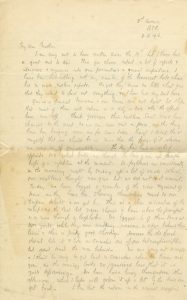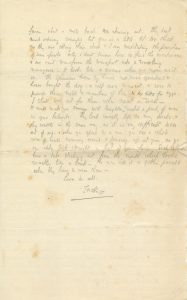Transcription
8th Queens
B. E. F.
2. 5. 1916.
My dear Mother,
I am sorry not to have written since the 30th, but I have had a great deal to do. The gas shows entail a lot of reports & interviews & inquiries into our precautions & general dispositions. I had to write endless reports. As yet they know so little about gas that they want to find out everything, so I have laid my soul bare
Gas is a fiendish business & our losses are not light but I hope that most of them will return in a day or two when the effects have worn off. Thank goodness this endless East Wind has changed to the West, so we can now rest in peace, as this thing has been hanging over us for some time though I didn’t think myself that we should be in more than the fringe of it, whereas we were in the very middle. The Hun has had a relief opposite too which looks as though he has given up any hope of a repetition at the moment. he frightened us considerably on the succeeding night by sending up a lot of smoke, which our neighbours thought was gas but we did not & it wasn’t. To-day we have bagged a number of the new regiment of Huns, as they have been showing themselves much to our snipers delight & we got 6. This is a clear indication of the relief, as the last lot never showed a hair above the parapet or a nose through a loophole. We bagged 6 of these Huns at 1600 yards while they were walking across a ridge behind their lines & this is a pretty good shooting. However the Bosch didn’t like it & later on smashed one of our telescopic rifles but didn’t touch the man behind. We are going out to-night & I shan’t be sorry to get back to somewhere where the leaves are green, as the country looks so jaundiced here that it is quite depressing. We have had a heavy thunderstorm this afternoon, which I hope will colour it up a bit by the time we get back. I hear that the natives in the nearest occupied farm about a mile back are clearing out. They don’t mind ordinary crumps but gas is a little bit too thick so they are selling their stock & I am meditating the purchase of some fowls only I don’t know how to feed the creatures, & one can’t transform the transport into a travelling menagerie. It looks like a circus when we move as it is. The Gunners near by have no such qualms & have bought the dog, a calf as a mascot, a cow to provide their milk & numbers of hen to do ditto for the eggs. I shall look out for these when next on trek.
It would make you scream with laughter to watch a party of men in gas helmets. They look exactly like so many ducks & they waddle in the same way, as it is very difficult to see out of one, & when you speak to a man you see a whole row of heads turning round & peering up at you, as you can only look straight in front of your face. Each helmet has a tube sticking out from the mouth which looks exactly like a beak – the men call it a goblin parade when they have to wear them.
Love to all.
Jack.
Commentary
During the gas attack on the 30 April, Peirs was in command of the battalion, which meant he was stuck to the telephone communicating information back to brigade. As such, when it came time to write up the events, he was left with the responsibility, and characteristically, dislikes the military minutiae of writing his report.
Several other points are worthy of brief commentary. Peirs is enthusiastic about their snipers killing six of the enemy. As in all of his letters, he is livelier when describing action than the banality of trench duty which dispirited him. Like many others, he used hunting terms to describe this side of the war; their snipers ‘bagged’ the enemy through ‘pretty good shooting.’
Also, Peirs mentions civilians fleeing their homes as a result of the gas attacks. Evidently, shelling over the past year hadn’t driven them away, but gas did. Peirs mentions buying some birds from them and that the divisional artillery bought a dog and some cows as they fled their farms for safety.
Finally, we have Peirs describing his men in their gas helmets during the attack in a humorous way. ‘They look exactly like so many ducks & they waddle in the same way,’ he wrote. Historian Alexander Watson writes of soldiers in the trenches that, ‘Humour was widely used to reinterpret the environment positively, making it less threatening and thus less frightening’ (Enduring the Great War, p. 90). Peirs displays this characteristic in many of his letters, perhaps none more apparent than in this one, especially considering the casualties of his battalion and the frightening nature of a gas attack.


